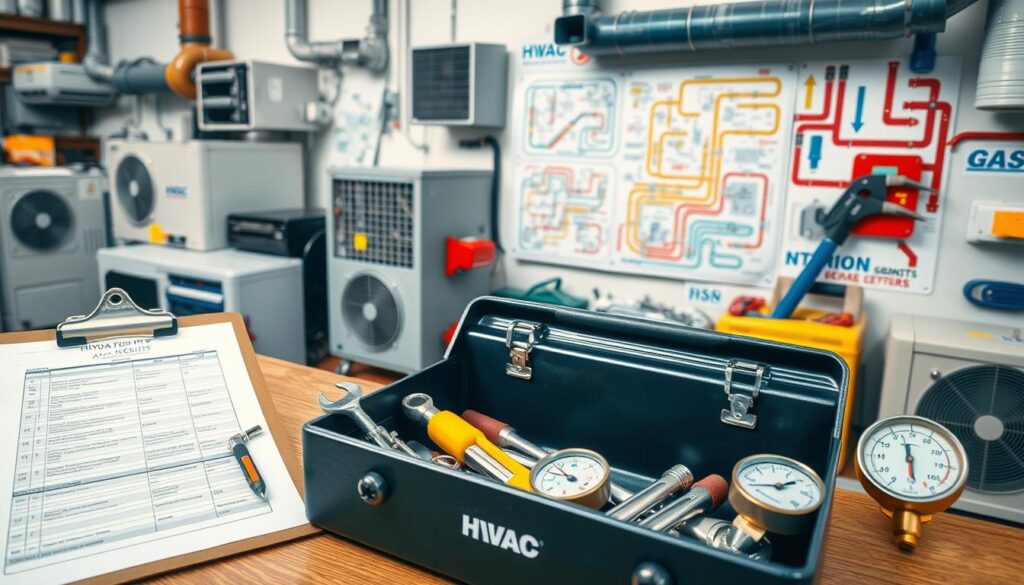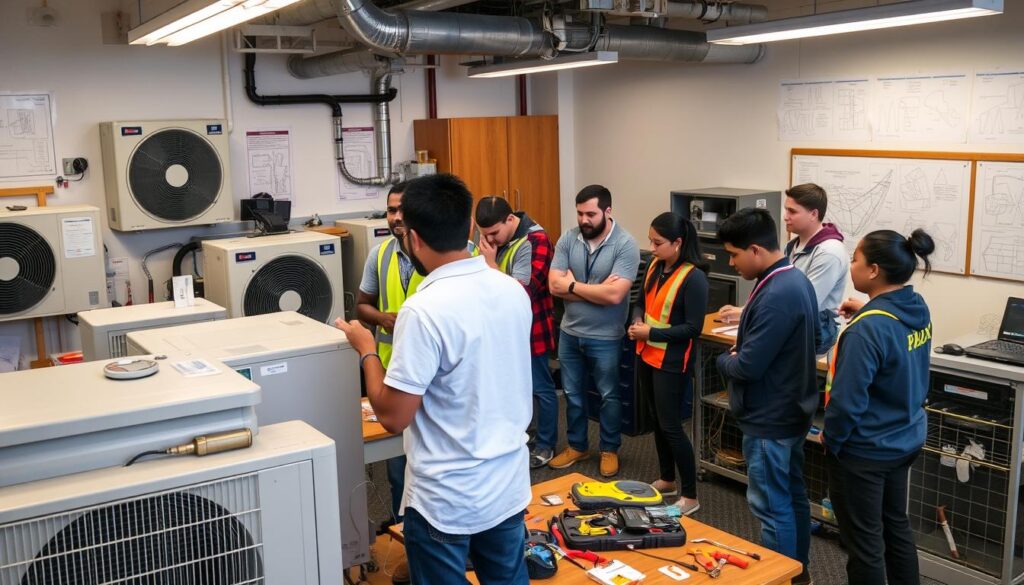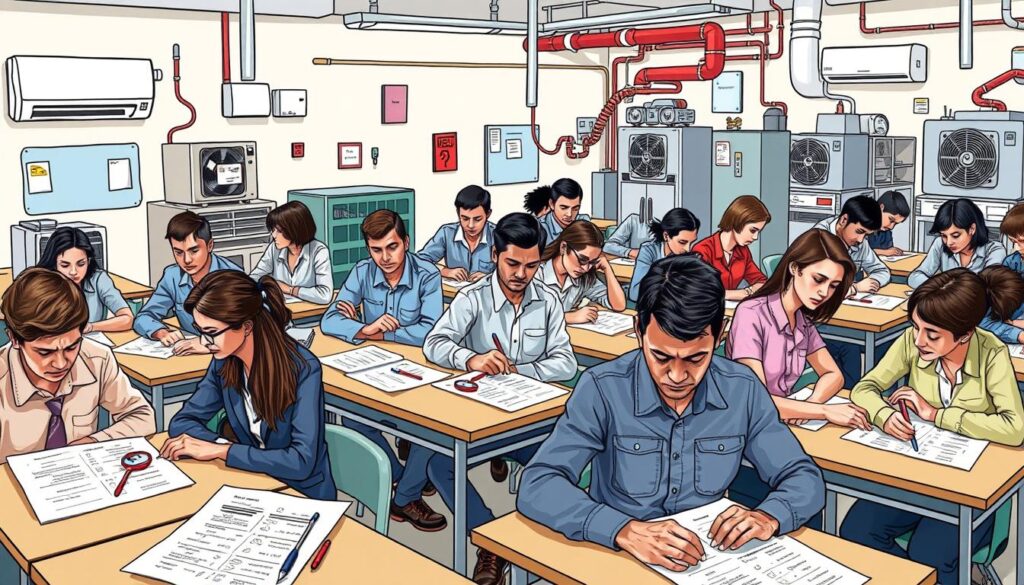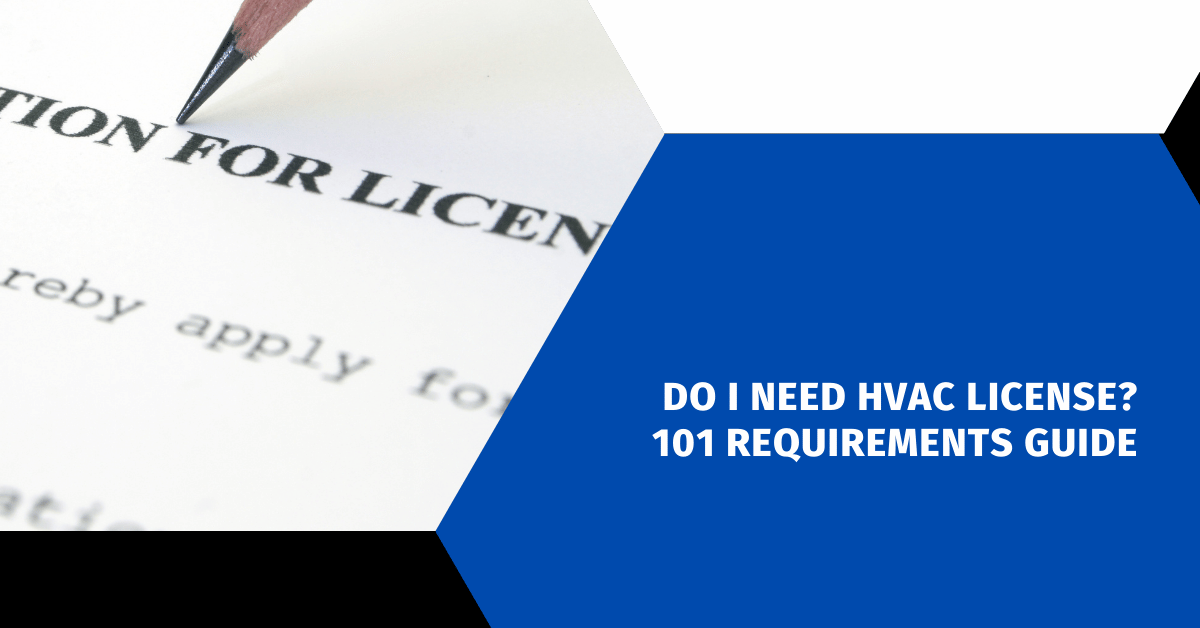Affiliate Disclosure
HVAC Guide Guys is a participant in the Amazon Services LLC Associates Program, an affiliate advertising program designed to provide a means for sites to earn advertising fees by advertising and linking to Amazon.
Do I Need HVAC License? As the weather changes, having a good HVAC system is key. Whether you’re a homeowner or a contractor, understanding HVAC licensing can be tough. This guide will help you know what steps to take to work legally and well in this field.

John, an experienced HVAC technician, shares his journey. “Getting my license was tough,” he says. “But the training and rules made sure only the best work on these systems.”
John’s story shows why HVAC licensing is crucial. It keeps the public safe and ensures top-quality work. As you work towards your HVAC license, remember John’s journey. The challenges you face will prepare you for success in this field.
Key Takeaways
- HVAC licensing is required in most states for professionals working in heating, ventilation, air conditioning, and refrigeration.
- Licensing requirements vary by state and may include education, experience, exams, and insurance.
- Obtaining an HVAC license ensures technicians meet industry standards and legal requirements.
- The HVAC industry is projected to grow by 4% by 2029 despite the impact of COVID-19.
- The cost of obtaining an HVAC license or certification can range from a few hundred to a few thousand dollars.
Table of Contents
Understanding HVAC Licensing Fundamentals
HVAC licensing is key in the heating, ventilation, air conditioning, and refrigeration world. It makes sure professionals know their stuff and can do their jobs well. This helps keep everyone safe and makes sure work is up to par.
Definition of HVAC Licensing
HVAC licensing means HVAC techs and contractors need to get certified to work legally. These licenses show they’re skilled and can do jobs like install, fix, and maintain HVAC systems.
Why Licensing Matters in HVAC Industry
Licensing is vital for many reasons. It makes sure pros are skilled and can work safely with complex systems. It also keeps work quality high and protects consumers from bad work. Plus, licensed pros keep up with new tech and rules.
Legal Requirements Overview
What you need to get an HVAC license varies by state. You might need to have gone to school, have work experience, pass tests, and keep learning. Some states want extra training for certain jobs. Keeping your license means you have to keep learning about new things in the field.
| HVAC License Requirement | Typical Criteria |
|---|---|
| Education | High school diploma or GED, completion of an accredited HVAC trade school program |
| Experience | Minimum years of hands-on experience, often through apprenticeships or internships |
| Examinations | Written and practical tests covering topics like electrical systems, refrigeration, and mechanical systems |
| Continuing Education | Mandatory ongoing training to stay updated with industry advancements and regulations |
Knowing about hvac license by state, hvac license exam, and hvac license renewal helps HVAC pros. It helps them follow the rules and work safely and legally.
State-by-State HVAC License Requirements
Understanding hvac licensing requirements across the United States can be tough. Each state has its own rules, education needs, and application steps. Knowing these hvac license by state details is key to legally working in HVAC.
In Alabama, you need specific education and experience. Alaska has different licenses for various HVAC jobs. California requires a specialty license for jobs over $500. Colorado doesn’t have state-wide HVAC licenses, but cities might have their own rules.
It’s vital to check the hvac licensing requirements in your state and local area. Knowing this will help you through the licensing process and set you up for success in HVAC.
| State | HVAC License Requirements | License Fees |
|---|---|---|
| Alabama | Specific education and experience requirements | $150 exam fee |
| Alaska | Multiple license categories for HVAC specialties | $150 application fee, $200-$600 license fee |
| California | Specialty license required for jobs over $500 | $450 application fee |
| Colorado | No state-level licensing, but local requirements may apply | N/A |
Knowing the hvac licensing requirements for each state helps HVAC pros get ready for work. Keeping up with these rules is important for a good HVAC career.
Explore Our HVAC Shop
Looking for top-rated HVAC tools, parts, and accessories? Visit our shop and find the perfect solution for your needs.
Visit the ShopDo I Need HVAC License to Work Legally?
If you’re thinking about a career in HVAC, knowing the licensing rules is key. There’s no federal law requiring HVAC licenses. But, most states and many cities do need them for HVAC work.
Federal Regulations
At the federal level, there’s no law requiring HVAC licenses. Yet, some federal rules, like those from the Environmental Protection Agency (EPA), might need special certifications. This is especially true for work with refrigerants.
State-Level Mandates
Most states have their own HVAC licensing laws. You’ll need to pass exams, meet education and experience needs, and have the right insurance. The rules can change a lot from state to state, so it’s important to check your area’s laws.
Local Municipality Requirements
Many cities also have their own HVAC rules. These might include extra certifications, permits, or inspections before you can work. It’s crucial to know these local rules to work legally.
To work legally in HVAC, always check both state and local laws before starting any project. Not having the right licenses and permits can lead to fines, legal trouble, and even stop you from working.
“Licensing in the HVAC industry is mandatory in many states, including New York, as a means of regulation.”
| HVAC License Requirements by State | States Requiring Licenses | States Without HVAC Licensing |
|---|---|---|
| Most states require HVAC licenses, with varying levels of experience, education, and examination prerequisites. |
|
|
Remember, needing an hvac contractor license or hvac technician certification is crucial for legal work in HVAC. Always check the specific needs in your area to follow the law and avoid legal problems.
Types of HVAC Licenses Available
In the HVAC industry, different states have different licenses. But, there are common ones like apprentice, journeyman, and master licenses.
The apprentice license is for beginners. It lets them work with a more experienced HVAC pro. Journeyman licenses mean you’re more skilled and can work on your own more.
The master HVAC license is for the top experts. They can lead HVAC projects and have more duties.
Some states have special licenses for certain HVAC tasks. For example, Alaska has licenses for heating, cooling, and process piping. They also have a special HVAC/sheet metal license.
The license you need depends on the project and the state’s rules. HVAC pros need to know the rules in the places they work.
| HVAC License Types | Description |
|---|---|
| Apprentice | Entry-level credential, allows work under supervision |
| Journeyman | Higher level of expertise, can work independently |
| Master | Highest credential, can oversee and manage projects |
| Specialty Licenses | Specific to areas like residential systems or refrigeration |
The HVAC industry has many license types. Each has its own rules and work scope. Knowing these is key for HVAC pros to grow their careers.
Explore Our HVAC Shop
Looking for top-rated HVAC tools, parts, and accessories? Visit our shop and find the perfect solution for your needs.
Visit the ShopEducational Requirements for HVAC Licensing
If you want to work in the HVAC (Heating, Ventilation, and Air Conditioning) field, you need to meet certain educational needs. To get licensed, you’ll need to complete academic requirements, technical training, and apprenticeships.
Academic Prerequisites
Most states ask for a high school diploma or GED to start. This basic education prepares you for more specialized HVAC training. It ensures you have the skills and knowledge needed to succeed.
Technical Training Programs
After the basic education, many choose to attend technical training programs. These are found at trade schools, community colleges, or universities. They teach HVAC systems, installation, maintenance, and repair. This training is key to getting a license and gaining experience.
Apprenticeship Options
Many states also offer HVAC apprenticeships. These combine on-the-job training with classroom learning. Apprenticeships last 3 to 5 years, helping you develop the skills needed to work independently.
The path to getting an HVAC license varies by state and local rules. It’s crucial to check your area’s requirements. This ensures you meet all the qualifications for an HVAC license and start a fulfilling career.
| State | Educational Requirements for HVAC Licensing |
|---|---|
| Illinois | No state-level license required, but some municipalities may have their own requirements. Technical training programs and apprenticeships are recommended. |
| Florida | Requires a four-year construction-related degree or a combination of college credits and relevant work experience. Completion of state-approved exams is also necessary. |
| Oklahoma | Offers three types of HVAC licenses: contractor (highest level), journeyman (mid-level), and apprentice (beginner). Formal training programs or apprenticeships are required, along with passing state exams. |

“Obtaining an HVAC license can open up a world of career opportunities in a rapidly growing industry. The educational requirements may vary, but a combination of formal training and hands-on experience is key to becoming a skilled and licensed HVAC professional.”
HVAC License Application Process
Getting an HVAC license is key for those wanting to work legally in the HVAC field. The hvac license application and hvac certification process differ by state. Yet, there are common steps applicants need to know.
First, you must show you’ve got the right education and experience. States often ask for a certain number of years working in HVAC. You also need to have finished technical training or an apprenticeship. You’ll need to send in proof of these things first.
Next, you’ll likely need to pass a licensing exam. These tests check your HVAC knowledge, including systems, installation, and safety. The exam details can change by state, so make sure to check the specific rules for where you want to work.
The application process might also ask for background checks, insurance, and fees. Some places even need you to get pre-approval before the exam. It’s important to follow all state rules closely to avoid delays.
To wrap it up, the main steps in getting an HVAC license are:
- Showing your education and work history
- Passing the licensing exams
- Providing insurance or bonding proof
- Pay the application fees
- Meet any pre-approval needs
By following these steps in the hvac license application and hvac certification process, you can meet legal requirements. This sets you up for a rewarding career in HVAC.
Explore Our HVAC Shop
Looking for top-rated HVAC tools, parts, and accessories? Visit our shop and find the perfect solution for your needs.
Visit the ShopHVAC License Examination Details
Getting an HVAC license is key for those wanting to work legally in the heating, ventilation, and air conditioning field. The exam checks both technical skills and business knowledge. It makes sure HVAC techs can work safely and efficiently.
Exam Structure and Content
HVAC exams cover many topics, like electrical systems and safety. They might be open-book or closed-book, depending on the state. For example, Kentucky’s Journeyman and Master HVAC exams are open-book.
Study Resources and Preparation
There are many ways to get ready for the HVAC exam. You can use prep courses, practice tests, and books. States like Ohio work with companies like Prov to help candidates prepare.
Testing Centers and Scheduling
HVAC exams are usually on computers at testing centers across the state. In Kentucky, Prov has centers in cities like Ashland and Louisville. You can book your exam through Prov, which offers flexible times. But, you need to show up or cancel on time to avoid losing your fee.

HVAC License Costs and Fees
Getting an HVAC license is a big step, but it’s worth it in the long run. The cost of getting licensed varies a lot. It depends on where you are and what license you want.
The hvac license cost can be from $1,500 to $30,000. This is because of the training program, how long it lasts, and what specialty you choose. Costs for certification exams from groups like North American Technical Excellence (NATE) and HVAC Excellence are $40 to $240 per section.
Don’t forget about state licensing fees. These can be from $100 to $300 for the first application. Then, there are yearly renewal fees of $50 to $150. You might also need to pay for books, bonding, and insurance.
Even though it costs a lot upfront, hvac certification fees are worth it. Certified HVAC techs make more money and have more job options. They are more competitive in the job market.
| Cost Category | Estimated Range |
|---|---|
| HVAC Training Program | $1,500 – $30,000 |
| Certification Exams | $40 – $240 per section |
| State Licensing Fees | $100 – $300 (initial), $50 – $150 (annual renewal) |
| Additional Expenses | $500 – $10,000 (books, supplies, housing, tools) |
Knowing about hvac license cost and hvac certification fees helps plan your career. It sets you up for success in the HVAC field.
Explore Our HVAC Shop
Looking for top-rated HVAC tools, parts, and accessories? Visit our shop and find the perfect solution for your needs.
Visit the ShopLicense Renewal and Continuing Education
Keeping your HVAC license current is a continuous task. It often means renewing your license and completing continuing education (CE) hours. Most states require you to renew your license every year or two, with specific dates varying.
To renew, you usually need to pay a fee and finish CE hours. CE keeps you updated on the latest in the HVAC field. For example, New Jersey asks for 5 hours of CE before each renewal.
The rules for CE and renewal differ by state. Alabama and Kentucky need renewal every year. Alaska, Florida, and Georgia renew every two years. Iowa, New Mexico, Oklahoma, and Virginia renew every three years.
Some states also ask for a certain number of work hours in HVAC. CE hours vary, from less than a day to more, based on state rules.
Fortunately, CE for HVAC pros is often online. This makes it easy and convenient to keep up with industry standards. It helps you meet your state’s renewal needs.
Key Renewal and CE Considerations
- Renewal timelines vary, with some states requiring annual, biennial, or triennial renewal.
- Experience requirements may include a specific number of HVAC work hours during the previous renewal cycle.
- Continuing education (CE) is a common requirement, often ranging from the equivalent of less than one workday per year to a more substantial amount.
- CE is often available online, providing flexibility and convenience for HVAC professionals.
- The renewal process may involve submitting paperwork on time, either online or through paper forms, along with the required renewal fees.
Keeping your HVAC license up to date is key to staying in the game. Knowing your state’s renewal and CE rules helps keep your license valid. It also ensures you can offer the best service to your customers.
Insurance and Bonding Requirements
As an HVAC contractor, it’s vital to have the right insurance and bonding. This ensures you can operate legally and protect your business. Let’s explore the key insurance and bonding needs you should know about.
General Liability Insurance
Most states require HVAC contractors to have general liability insurance. This policy protects you from claims for property damage or injuries during your work. The coverage amount can vary, but it’s often $500,000 or $1 million per occurrence.
Bonding Requirements
Surety bonds are also a common need for HVAC contractors. These bonds offer financial protection for your clients, ensuring you finish projects as agreed. The bond value usually ranges from $1,000 to $20,000, with a premium of 1-5% of the bond amount. HVAC bonds are required in various states, including Alabama, Alaska, Arizona, Arkansas, California, and many others.
Workers’ Compensation Coverage
If you have employees, you’ll need workers’ compensation insurance. This coverage protects them from job-related injuries or illnesses. The specific requirements can vary by state, so it’s important to check local regulations.
Having the right insurance and bonding is crucial for HVAC contractors. Not meeting these requirements can lead to fines or even license suspension. Make sure to stay updated on the latest hvac contractor insurance and hvac bonding requirements in your state.
| State | HVAC Bond Requirement | General Liability Insurance Minimum |
|---|---|---|
| Florida | $20,000 | $500,000 |
| California | $15,000 | $1 million |
| Texas | $10,000 | $300,000 |
Explore Our HVAC Shop
Looking for top-rated HVAC tools, parts, and accessories? Visit our shop and find the perfect solution for your needs.
Visit the ShopCareer Opportunities with HVAC License
Getting an HVAC license opens doors to many career paths. The U.S. Bureau of Labor Statistics says the HVAC field will grow 6% from 2022 to 2032. This shows a bright future for those with a license.
With a license, you can be a technician, contractor, or even start your own HVAC business. You can also specialize in green tech or commercial systems for better pay. For example, HVAC mechanics and installers in New Jersey make about $66,980 a year.
As you gain more experience and get more certifications, your career can grow. HVAC technicians with EPA 608, HVAC Excellence, NATE, and RSES certifications show they’re experts. This can lead to better jobs and higher pay.
- Certifications can lead to higher pay and increased job opportunities for HVAC technicians.
- Certified HVAC technicians may be eligible for bonuses or incentives from their employers.
- Certification validates skills and knowledge, enhancing credibility and employability in the field.
It’s important for HVAC technicians to keep learning. This helps them stay current with the latest in the field. By investing in your HVAC license and education, you set yourself up for success and growth.
“Heating, ventilation, and air conditioning (HVAC) technicians are highly sought-after in the U.S. job market. Many states and localities require HVAC technicians to have a license before working as an HVAC contractor.”
Conclusion
Getting an HVAC license is key for both legal reasons and career growth. The steps to get a license vary by state. You need education, hands-on experience, exams, and ongoing learning. A license shows you’re skilled, can earn more, and opens doors for advancement.
The HVAC field keeps changing with new tech and rules. It’s vital to keep up with licensing needs and education. This way, you can offer top-notch services, keep installations safe and efficient, and help the industry grow.
Whether you’re new to HVAC or have years of experience, getting and keeping your license is a smart move. It’s an investment in your career and business future. By focusing on licensing and professional growth, you become a reliable HVAC expert. You’ll be able to serve your community well.

